名词性从句的翻译
名词性从句翻译
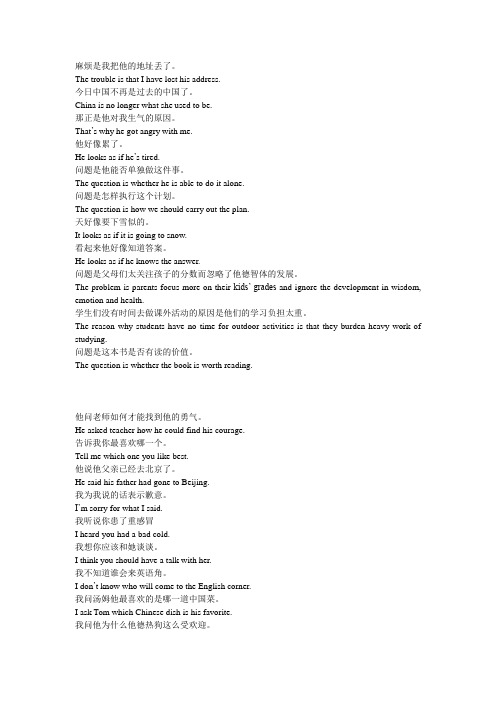
麻烦是我把他的地址丢了。
The trouble is that I have lost his address.今日中国不再是过去的中国了。
China is no longer what she used to be.那正是他对我生气的原因。
That’s why he got angry with me.他好像累了。
He looks as if he’s tired.问题是他能否单独做这件事。
The question is whether he is able to do it alone.问题是怎样执行这个计划。
The question is how we should carry out the plan.天好像要下雪似的。
It looks as if it is going to snow.看起来他好像知道答案。
He looks as if he knows the answer.问题是父母们太关注孩子的分数而忽略了他德智体的发展。
The problem is parents focus more on their kids’ grades and ignore the development in wisdom, emotion and health.学生们没有时间去做课外活动的原因是他们的学习负担太重。
The reason why students have no time for outdoor activities is that they burden heavy work of studying.问题是这本书是否有读的价值。
The question is whether the book is worth reading.他问老师如何才能找到他的勇气。
He asked teacher how he could find his courage.告诉我你最喜欢哪一个。
Tell me which one you like best.他说他父亲已经去北京了。
英语八大从句类型例句
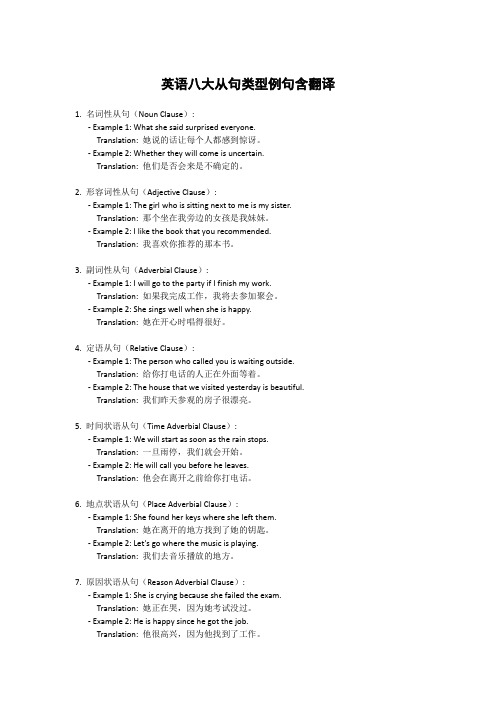
英语八大从句类型例句含翻译1. 名词性从句(Noun Clause):- Example 1: What she said surprised everyone.Translation: 她说的话让每个人都感到惊讶。
- Example 2: Whether they will come is uncertain.Translation: 他们是否会来是不确定的。
2. 形容词性从句(Adjective Clause):- Example 1: The girl who is sitting next to me is my sister.Translation: 那个坐在我旁边的女孩是我妹妹。
- Example 2: I like the book that you recommended.Translation: 我喜欢你推荐的那本书。
3. 副词性从句(Adverbial Clause):- Example 1: I will go to the party if I finish my work.Translation: 如果我完成工作,我将去参加聚会。
- Example 2: She sings well when she is happy.Translation: 她在开心时唱得很好。
4. 定语从句(Relative Clause):- Example 1: The person who called you is waiting outside.Translation: 给你打电话的人正在外面等着。
- Example 2: The house that we visited yesterday is beautiful.Translation: 我们昨天参观的房子很漂亮。
5. 时间状语从句(Time Adverbial Clause):- Example 1: We will start as soon as the rain stops.Translation: 一旦雨停,我们就会开始。
英语从句的翻译
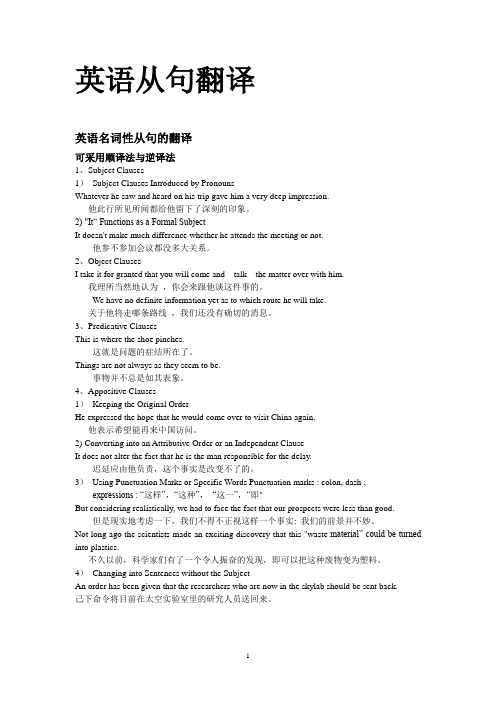
英语从句翻译英语名词性从句的翻译可采用顺译法与逆译法1、Subject Clauses1)Subject Clauses Introduced by PronounsWhatever he saw and heard on his trip gave him a very deep impression.他此行所见所闻都给他留下了深刻的印象。
2) "It“ Functions as a Formal SubjectIt doesn't make much difference whether he attends the meeting or not.他参不参加会议都没多大关系。
2、Object ClausesI take it for granted that you will come and talk the matter over with him.我理所当然地认为,你会来跟他谈这件事的。
We have no definite information yet as to which route he will take.关于他将走哪条路线,我们还没有确切的消息。
3、Predicative ClausesThis is where the shoe pinches.这就是问题的症结所在了。
Things are not always as they seem to be.事物并不总是如其表象。
4、Appositive Clauses1)Keeping the Original OrderHe expressed the hope that he would come over to visit China again.他表示希望能再来中国访问。
2) Converting into an Attributive Order or an Independent ClauseIt does not alter the fact that he is the man responsible for the delay.迟延应由他负责,这个事实是改变不了的。
名词性从句汉译英
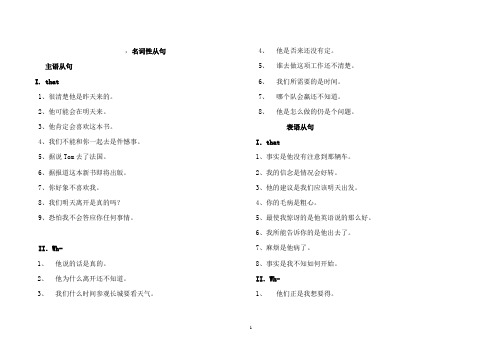
,名词性从句主语从句I. that1、很清楚他是昨天来的。
2、他可能会在明天来。
3、他肯定会喜欢这本书。
4、我们不能和你一起去是件憾事。
5、据说Tom去了法国。
6、据报道这本新书即将出版。
7、你好象不喜欢我。
8、我们明天离开是真的吗?9、恐怕我不会答应你任何事情。
II.Wh-1、他说的话是真的。
2、他为什么离开还不知道。
3、我们什么时间参观长城要看天气。
4、他是否来还没有定。
5、谁去做这项工作还不清楚。
6、我们所需要的是时间。
7、哪个队会赢还不知道。
8、他是怎么做的仍是个问题。
表语从句I.that1、事实是他没有注意到那辆车。
2、我的信念是情况会好转。
3、他的建议是我们应该明天出发。
4、你的毛病是粗心。
5、最使我惊讶的是他英语说的那么好。
6、我所能告诉你的是他出去了。
7、麻烦是他病了。
8、事实是我不知如何开始。
II.Wh-1、他们正是我想要得。
2、问题是它是否值得一做。
3、问提是我们该作些什么来帮助他。
4、问题是谁留下。
5、那就是他出生的地方。
6、我们就是这样分手的。
7、我是你正在找的那个人。
8、这就是我去那的原因同位语从句I.that1、我听到了我们队获胜的消息。
2、他在会上什么都没说的事实使我们惊讶。
3、他打算来的消息使我们高兴。
4、他已经下定学好英语的决心。
5、他当选的消息不是真的。
II.Wh-1、我不知道他什么时候来。
2、你不知道我多么着急。
3、很难回答你提出的我是如何做的问题。
4、我提出的如何邀请他的问题已经得到了解决。
5、你为什么对音乐感兴趣的问题还没回答。
宾语从句I. That clause1,我认为他们学习很努力。
2,他说他将在11日动身。
3,他告诉我医生马上就来。
4,他说他妈妈在读书。
5,他说他的爸爸生于1948年。
6,我恐怕犯了一个错误。
7,我们有把握成功。
8,对不起我错拿了你的钢笔。
II.Whether/ if1,我想知道他明天是否来。
2,我想知道你是否愿意和我一起去看足球赛。
名词性从句翻译
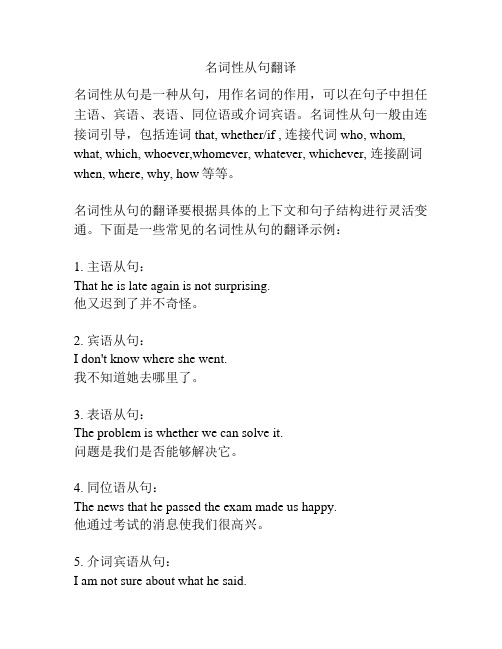
名词性从句翻译名词性从句是一种从句,用作名词的作用,可以在句子中担任主语、宾语、表语、同位语或介词宾语。
名词性从句一般由连接词引导,包括连词that, whether/if , 连接代词who, whom, what, which, whoever,whomever, whatever, whichever, 连接副词when, where, why, how等等。
名词性从句的翻译要根据具体的上下文和句子结构进行灵活变通。
下面是一些常见的名词性从句的翻译示例:1. 主语从句:That he is late again is not surprising.他又迟到了并不奇怪。
2. 宾语从句:I don't know where she went.我不知道她去哪里了。
3. 表语从句:The problem is whether we can solve it.问题是我们是否能够解决它。
4. 同位语从句:The news that he passed the exam made us happy.他通过考试的消息使我们很高兴。
5. 介词宾语从句:I am not sure about what he said.我不确定他说的是什么。
6. 间接引导名词性从句:He asked where I lived.他问我住在哪里。
7. 是否从句:I wonder whether/if she will come to the party.我想知道她是否会来参加派对。
8. 选择性从句:He asked me whether I preferred coffee or tea.他问我是喜欢咖啡还是茶。
9. 宾语从句(陈述句变为疑问句):Do you know what time it is?你知道现在几点钟吗?10. 宾语从句(连接代词):I wonder who is going to pick us up at the airport.我想知道谁会在机场接我们。
第12章名词性从句的翻译ppt课件
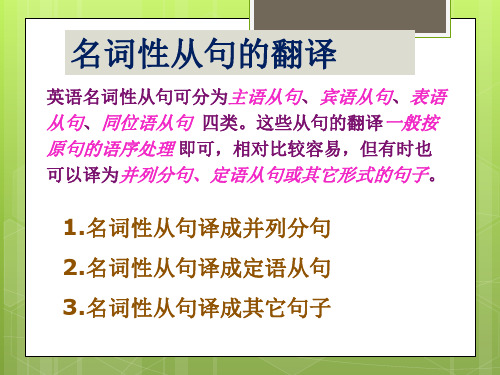
Not long ago the scientists made an exciting discovery that this “waste” material could be turned into plastics. (同位语从句)
名词性从句的翻译
英语名词性从句可分为主语从句、宾语从句、表语 从句、同位语从句 四类。这些从句的翻译一般按 原句的语序处理 即可,相对比较容易,但有时也 可以译为并列分句、定语从句或其它形式的句子。
1.名词性从句译成并列分句 2.名词性从句译成定语从句 3.名词性从句译成其它句子
1.译成并列分句
如果名词性从句包含两层以上的意思,需要把主句与从句 分开译。一般先译出从句,放在句首,然后用汉语的复指 代词“这”“那”,与主句的其他成分连成一句。同位语 从句的翻译与定语从句的翻译非常近似,可以将同位语从 句放在名词前,相当于前置的修饰语,但不必使用定语的 标志“的”字;可以保持原句的语序,译为后置的并列句, 加入冒号、破折号或“这样”、“这…”、“那就是”、 “即”等字眼;也可以改变原句的同位语结构,采用汉语 的无主句或其它方式的译法。
(宾语从句) 如果没有城市的支持, 简直难以想象会有大学、医院和大 企业, 甚至连科学技术也不会有。
4.We fail to learn that pain is the body's way of in-
forming the mind that we are doing something wrong, not necessarily that something is wrong.
翻译技巧 8 名词性从句的翻译
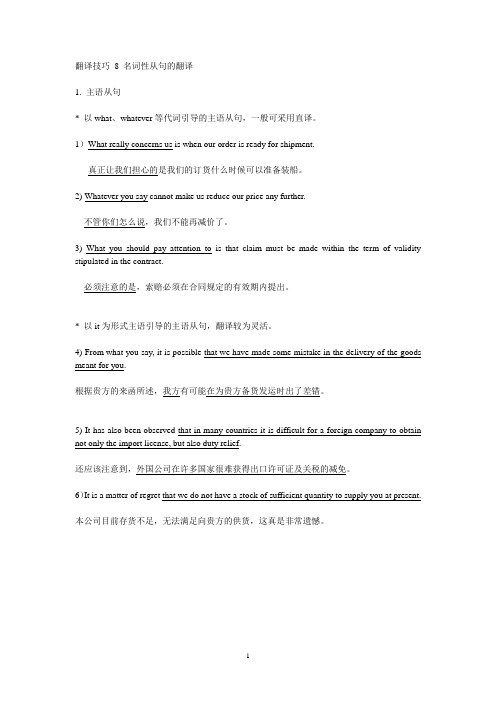
翻译技巧8 名词性从句的翻译1. 主语从句* 以what、whatever等代词引导的主语从句,一般可采用直译。
1)What really concerns us is when our order is ready for shipment.真正让我们担心的是我们的订货什么时候可以准备装船。
2) Whatever you say cannot make us reduce our price any further.不管你们怎么说,我们不能再减价了。
3) What you should pay attention to is that claim must be made within the term of validity stipulated in the contract.必须注意的是,索赔必须在合同规定的有效期内提出。
* 以it为形式主语引导的主语从句,翻译较为灵活。
4) From what you say, it is possible that we have made some mistake in the delivery of the goods meant for you.根据贵方的来函所述,我方有可能在为贵方备货发运时出了差错。
5) It has also been observed that in many countries it is difficult for a foreign company to obtain not only the import license, but also duty relief.还应该注意到,外国公司在许多国家很难获得出口许可证及关税的减免。
6)It is a matter of regret that we do not have a stock of sufficient quantity to supply you at present.本公司目前存货不足,无法满足向贵方的供货,这真是非常遗憾。
翻译4.5:名词性从句的翻译
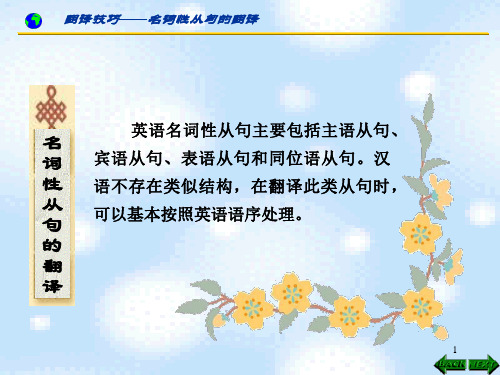
4) It is a matter of common experience that bodies
are lighter in water than they are in air.
物体在水中比在空气中轻,这是一种常识。
6
翻译技巧——1. 主语从句的翻译
discussions.
教授们和女生都发现,男孩子正在逐渐“接管”课堂讨论。
9
翻译技巧——1. 主语从句的翻译
3) It is imagined by many that the operations of the common mind can by no means be compared with these processes.
许多人认为普通人的思维活动根本无法与这些过程相比。
4) It was thought that this drug was blown into the bedroom through a tube in the form of a fine powder which the sleeper breathed in.
青少年现在购物更多了,这就会使他们在光顾的商店里花钱多。
2) That aspect has to be weighed against the fact that they might not help your career plans.
但这些工作可能无助于你的择业规划,你必须在这两个方面权 衡一下。
这些组织指控海军的计划违背了保护动物不受虐待的
联邦法律。
11
翻译技巧——2. 宾语从句的翻译
2) But critics wonder if dolphins can be trusted to
- 1、下载文档前请自行甄别文档内容的完整性,平台不提供额外的编辑、内容补充、找答案等附加服务。
- 2、"仅部分预览"的文档,不可在线预览部分如存在完整性等问题,可反馈申请退款(可完整预览的文档不适用该条件!)。
- 3、如文档侵犯您的权益,请联系客服反馈,我们会尽快为您处理(人工客服工作时间:9:00-18:30)。
名词性从句的翻译
Substantive Clause Translation
包括主语从句、表语从句、宾语从句及同位语从句四类。
重点讲解同位语从句的翻译。
尤其是避免“即”、“:”、“——”之类的译法。
主语从句及翻译
(一)以what, who, whether, that, where, why, how, when等代词引导的主语从句翻译时一般可按照原文顺序翻译。
例如:
Why metals can conduct electricity is an interesting problem.
金属为什么能导电是一个有趣的问题。
That energy can be neither created nor destroyed is a very important law in physical science.
能量既不能创造也不能消灭是物理学的一条很重要的定律。
Whether an organism is a plant or an animal sometimes taxes the brains of a biologist. 一种生物是植物还是动物,有时使生物学家很伤脑筋。
When it was first invented is not known.
它最初是什么时候发明的,现在还不知道。
Where the water has gone can easily be answered.
水到哪里去了,这很容易回答。
(二)形式主语it +谓语+ that (whether)引导的从句,汉译时一般先译从句再译主句。
例如:
It is a matter of common experience that bodies are lighter in water than they are in air. 众所周知,物体在水中比在空气中轻。
It is no longer a question whether man can fly to the moon.
人能否飞上月球,现在已不再是什么问题了。
It is certain that we shall produce this kind of engine.
毫无疑问,我们将生产这种发动机。
表语从句及翻译
表语从句位于主句的连系动词之后,引导表语从句的从属连词和引导主语从句的从属连词相同。
汉译时,顺序不变。
例如:
The question is how the people can find an effective way to store the sun’s heat.
问题在于人们怎样才能找到一种有效的方式来储藏太阳热。
This is what the equation means.
这就是此方程式的含义。
That’s why the plants absorb water from the soil.
这就是植物从土壤中吸收水分的原因。
宾语从句及翻译
宾语从句既可以是动词的宾语,也可以是某些形容词或介词的宾语。
宾语从句也可以出现在由it作形式宾语的句子中,汉译时,顺序一般不变。
例如:
Scientists have long predicated that computers would one day help speed up the arduous task of translating texts.
科学家们早已预言,总有一天计算机将帮助我们加快艰巨的文字翻译工作。
We all know that cigarette smoking is hazardous to health and that alcohol abuse can kill.
我们都知道吸烟对健康有害,我们也知道酗酒会危害人的生命。
Nutritional experiments have made it evident that vitamins are indispensable for one’s health and growth.
营养实验证明,维生素对人们的健康和生长是不可缺少的。
同位语从句及翻译
英语中的同位语从句是用来说明它前面的某个名词的从句,它与其所修饰的名词在地位上是同等的。
同位语从句常用that, whether 或if引导,它们在从句中不充当任何句子成分。
汉译时可灵活处理,根据具体情况可采用合译、分译或转换等多种方法。
例如:
The suggestion that we should develop the natural resources in this region has been discussed.
关于我们应该开发本地区自然资源的建议已经被讨论过了。
There is no possibility that human beings will ever be controlled by robots.
人类不可能受机器人控制。
There is general acknowledgment that characteristics of an individual are a result of an interaction of genetics and environment.
众所周知,某一个体的特性是遗传和环境相互作用的结果。
There is no doubt that animal viruses can jump into humans.
毫无疑问,动物病毒能进入人体。
So far there is no proof that UFOs or spaceships from other planets do exist.
究竟有没有不明飞行物或来自其他行星的宇宙飞船,迄今为止尚无法证实。
经常与同位语从句连用的单词或短语包括:idea, fact, news, rumor, hope, belief, thought, doubt, proposition, suggestion, advice, agreement, message, probability, certainty, likelihood, evidence, on condition, on the supposition, on the ground(s), on the understanding, with the exception, in spite of the fact等。
